CORPORATE ACTION: Clorox
Burt’s Bees Works With RePurpose Global To Cut Plastic Waste, Create Jobs In India And Ghana
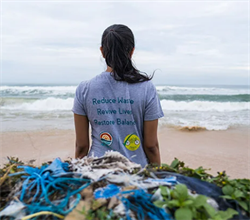 Burt’s Bees has partnered with rePurpose Global to help reduce plastic waste and improve livelihoods in India and Ghana. The company worked to establish the partnership as part of its efforts to achieve its Net Zero Plastic to Nature by 2025 sustainability goal. Also, the company aims to reduce by another 50% its use of virgin plastic and fiber by 2030 and achieve 100% recyclable, reusable, or compostable packaging. Burt’s Bees is supporting social enterprise Green Worms in India to help create “dignified work” in India, and Coliba in Ghana to support buyback centers for used PET bottles collected from the environment.[Image Credit: © The Clorox Company]
Burt’s Bees has partnered with rePurpose Global to help reduce plastic waste and improve livelihoods in India and Ghana. The company worked to establish the partnership as part of its efforts to achieve its Net Zero Plastic to Nature by 2025 sustainability goal. Also, the company aims to reduce by another 50% its use of virgin plastic and fiber by 2030 and achieve 100% recyclable, reusable, or compostable packaging. Burt’s Bees is supporting social enterprise Green Worms in India to help create “dignified work” in India, and Coliba in Ghana to support buyback centers for used PET bottles collected from the environment.[Image Credit: © The Clorox Company]
CORPORATE ACTION: Colgate
Colgate-Palmolive Works With Green Antz Builders To Expand Plastic Waste Collection In Philippines
 Colgate-Palmolive Philippines and Green Antz Builders have expanded a plastic waste collection program in the province of Bulacan, Philippines. The program now includes partnership deals with the governments of Manila, Quezon City, and Taguig, as well as with Department of Education units and city Environment and Natural Resources offices. The program also features collection points for plastic waste in different Ayala Malls in Metro Manila. During its first year of operation, the closed loop plastic waste management initiative has built 20 handwashing stations with eco-bricks made from recycled plastic.[Image Credit: © Green Antz Builders ]
Colgate-Palmolive Philippines and Green Antz Builders have expanded a plastic waste collection program in the province of Bulacan, Philippines. The program now includes partnership deals with the governments of Manila, Quezon City, and Taguig, as well as with Department of Education units and city Environment and Natural Resources offices. The program also features collection points for plastic waste in different Ayala Malls in Metro Manila. During its first year of operation, the closed loop plastic waste management initiative has built 20 handwashing stations with eco-bricks made from recycled plastic.[Image Credit: © Green Antz Builders ]
CORPORATE ACTION: Henkel
Henkel Launches 100 percent Recycled PET Bottle For Pril In Germany
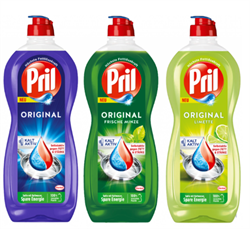
Henkel has collaborated with ALPLA to make a 100 percent recycled PET bottle for the Pril brand of dishwashing detergent in Germany. According to the company, the bottles will be manufactured using 50 percent recycled plastic waste collected through the country’s yellow bag collection system, with the remaining 50 percent from recycled plastic bottles. Plastic waste collected through the yellow bag systems are more diverse and are usually contaminated, making them harder to recycle.[Image Credit: © Henkel]
Henkel Makes Plastic-Free Packaging For Pritt Consumer Adhesives
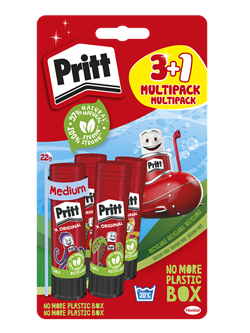
Henkel’s Pritt brand of adhesives plans to introduce plastic-free blister packaging for its lineup of consumer adhesive products worldwide. The company said it will first use the fully recyclable packaging for the Pritt glue sticks in early summer 2022. The plastic-free blister packs are made from at least 85% recycled paper and are part of the company’s efforts to achieve its sustainability goals for 2025.[Image Credit: © Henkel]
CORPORATE ACTION: Nestlé
Purina Releases Recyclable PP Mono-Material Pouches For Pet Food Lines In Europe
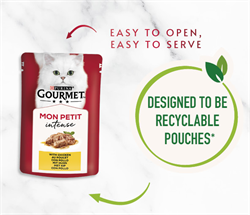
Purina plans to launch new mono-material pouches for its Gourmet Mon Petit and Felix Soup lines of pet foods in more than 20 countries across Europe. The move is part of the company’s efforts towards using 100% reusable or recyclable packaging by 2025. The recyclable pouches are made of Polypropylene and are designed to tolerate heating and sterilization processes.[Image Credit: © Nestle]
CORPORATE ACTION: Procter & Gamble
P&G Beauty Announces Shampoo And Conditioner Bars For Haircare Brands In Europe
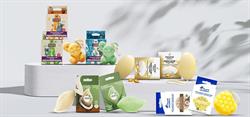 P&G Beauty announced that its European haircare brands, Head & Shoulders, Pantene, Herbal Essences and Aussie, will include shampoo and conditioner bars as of 2022. The company announced the products, which come in paper packaging, on World Oceans Day. The formulation of the shampoo bars means one bar is equivalent to up to two 250ml liquid shampoo bottles.[Image Credit: © P&G ]
P&G Beauty announced that its European haircare brands, Head & Shoulders, Pantene, Herbal Essences and Aussie, will include shampoo and conditioner bars as of 2022. The company announced the products, which come in paper packaging, on World Oceans Day. The formulation of the shampoo bars means one bar is equivalent to up to two 250ml liquid shampoo bottles.[Image Credit: © P&G ]
CORPORATE ACTION: Tesco
Tesco Expands Collection And Recycling Of Soft Plastic Packaging
.png&width=250&height=207)
UK retailer Tesco is expanding its initiative to collect and recycle soft plastics used in packaging. While soft plastics play an important role in packaging of food products, such as salad and vegetables, they are not usually collected for recycling from UK households. Tesco offered shoppers the opportunity to recycle their soft plastics in their stores and announced that some of the soft plastics will be used in making the reusable green produce trays for fruits and vegetables.[Image Credit: © Tesco plc]
Heinz Joins Forces With Tesco To Launch Pilot Recycling Of Soft Plastics
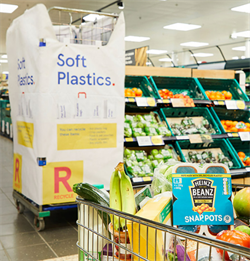
Heinz is working with Tesco to recycle soft plastics into food-grade packaging for Heinz Beanz Snap Pots. The pilot program will have Heinz recycling soft plastics returned by shoppers to Tesco stores to International Sustainability and Carbon Certification standards. Also, the program is expected to process up to 22 tonnes of soft plastic, including cling film, baby food, and pet food pouches.[Image Credit: © Heinz]
CORPORATE ACTION: Unilever
Unilever Introduces Refill Machine For Liquid Cleaning Products In Bangladesh
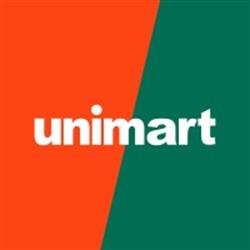
Unilever Bangladesh Limited has introduced the first refill system for liquid cleaning products in the country. The company has partnered with Unimart Limited in launching the refill program, which lets customers refill Rin and Vim brands of liquid cleaning products at a lower price. The refill machine is equipped with a touchscreen and is easy to operate, allowing shoppers to refill a previously used bottle.[Image Credit: © Unimartbd]
Reuters Highlights Unilever’s Insincere Efforts To End Single-Use Plastic Packaging
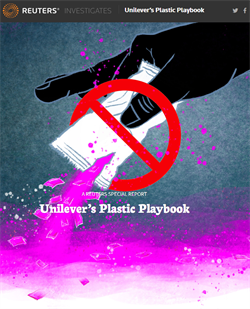 Reuters reports that while Unilever says it supports ending the use of single-use plastic packaging, the company continues using non-recyclable packaging material. The news agency’s report, “Unilever’s Plastic Playbook,” highlights the public statements by top company officials calling for an end to industry’s reliance on single-use plastic packaging. The report also details actions taken by the company that demonstrates its continued reliance on single-use plastic packaging. For example, the company has found a loophole to continue selling haircare sachets despite a ban in Sri Lanka. Meanwhile, the company’s much publicized recycling programs in India, the Philippines, and Sri Lanka have been cancelled or “not progressed beyond the pilot stage”.[Image Credit: © Reuters]
Reuters reports that while Unilever says it supports ending the use of single-use plastic packaging, the company continues using non-recyclable packaging material. The news agency’s report, “Unilever’s Plastic Playbook,” highlights the public statements by top company officials calling for an end to industry’s reliance on single-use plastic packaging. The report also details actions taken by the company that demonstrates its continued reliance on single-use plastic packaging. For example, the company has found a loophole to continue selling haircare sachets despite a ban in Sri Lanka. Meanwhile, the company’s much publicized recycling programs in India, the Philippines, and Sri Lanka have been cancelled or “not progressed beyond the pilot stage”.[Image Credit: © Reuters]
IHG Hotels & Resorts Collaborates With Unilever To Replace Single-Use Bathroom Miniatures
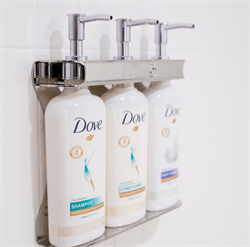
IHG Hotels & Resorts announced its agreement with Unilever to supply its hotel brands with full-size personal care and bathroom products. The deal is part of the hotel management company’s efforts to replace miniature bathroom products and remove single-use products by 2030. By replacing the bathroom miniatures, IHG Hotels & Resorts expects to save at least 850 tonnes of plastic waste every year in the Americas region alone.[Image Credit: © IHG Hotels & Resorts]
Unilever Joins Forces With CIRCULAR To Collect 1,000 Tonnes Of Plastic Waste In Bangladesh
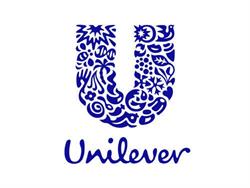
Unilever Bangladesh Limited has partnered with CIRCULAR to collect 1,000 tonnes of plastic waste from Dhaka in the one-year period to May 2023. Data from the World Bank shows only 30 percent of plastic waste produced in the country is collected, with only 37 percent recycled. UBL believes building a “sustainable circular loop that helps create a circular economy” is the way to prevent this plastic pollution catastrophe.[Image Credit: © Unilever plc]
CORPORATE ACTION: Other
Sainsbury’s Launches Own-Label Line Of Refillable Handwash Pouches
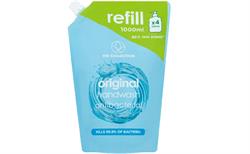 Sainsbury’s has announced the launch of its 1 litre private label refillable handwash pouches. The UK retailer said the pouches are made using 85 percent less plastic and claims the pouches can help customers reduce their household plastic waste by reusing their handwash bottle and. The pouches are 35 percent cheaper than similar-sized bottles and are predicted to save 28 tonnes of plastic every year.[Image Credit: © Sainsbury’s plc]
Sainsbury’s has announced the launch of its 1 litre private label refillable handwash pouches. The UK retailer said the pouches are made using 85 percent less plastic and claims the pouches can help customers reduce their household plastic waste by reusing their handwash bottle and. The pouches are 35 percent cheaper than similar-sized bottles and are predicted to save 28 tonnes of plastic every year.[Image Credit: © Sainsbury’s plc]
SC Johnson Joins Forces With Plastic Bank To Open Plastic Waste Collection Facility In Brazil’s Rio Region
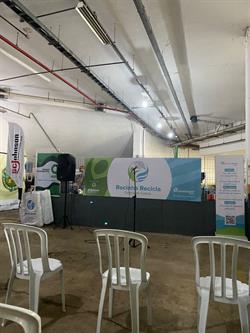
Plastic Bank collaborated with SC Johnson to open a plastic collection center in the Rocinha Sports Complex in the South Zone of Rio, Brazil. Plastic Bank is a social enterprise established to prevent plastic waste from reaching the ocean. It started operating in the country in 2019 and has collected over 137 million plastic bottles, with the support of more than 4,000 collection community members. Collectors are registered in the PlasticBank app and earn a bonus for every kilogram of plastic waste collected.[Image Credit: © SC Johnson ]
M&S Launches Line Of Refillable Own-Brand Household Cleaning And Laundry Products
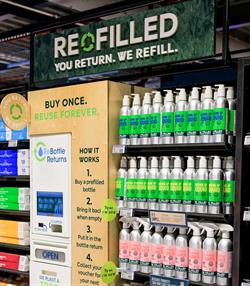
UK retailer Marks & Spencer has partnered with Re to launch the M&S Refillable line of refillable own-brand cleaning and laundry products. Customers need to pay a £2 deposit for the reusable bottle to gain access to eight pre-filled, own-brand homecare products, such as cleaning sprays, laundry detergents, and fabric conditioners. [Image Credit: © Marks & Spencer]
Mondelēz International Tests QR Code Campaign To Promote Sustainability In UK
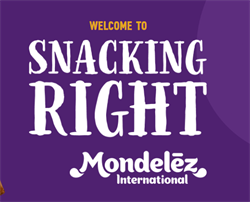
Mondelēz International has partnered with Merlin Entertainments to launch a 2022 summer marketing campaign for its Cadbury, Oreo, and Barny lines of snacks in the U.K. The campaign includes packaging that comes with a QR code that lets consumers access the Snacking Right online portal. The portal features the Recycle Now locator app for recycling facilities and other information on Mondelez International’s recycling and sustainability efforts.[Image Credit: © Mondelēz International ]
CAMPAIGNS, COMMITMENTS & NGOs
Changing Markets Foundation Calls Out Top Beauty Brands For Greenwashing
 Changing Markets Foundation has accused beauty companies, L’Oréal, P&G and L’Occitane of greenwashing, along with some of the world’s leading brands, such as Coca-Cola, Nike, and Tesco. The foundation based its claim on two research works, the report “Under Wraps” by Changing Markets Foundation and Break Free From Plastic, and research into the sustainability assertions of brands, retailers and other companies regarding plastic waste. Industry practices of beauty brands denounced by the foundation include the use of ocean-bound plastic and refill solutions with hard-to-recycle pouches.[Image Credit: © Changing Markets Foundation]
Changing Markets Foundation has accused beauty companies, L’Oréal, P&G and L’Occitane of greenwashing, along with some of the world’s leading brands, such as Coca-Cola, Nike, and Tesco. The foundation based its claim on two research works, the report “Under Wraps” by Changing Markets Foundation and Break Free From Plastic, and research into the sustainability assertions of brands, retailers and other companies regarding plastic waste. Industry practices of beauty brands denounced by the foundation include the use of ocean-bound plastic and refill solutions with hard-to-recycle pouches.[Image Credit: © Changing Markets Foundation]
Open Letter Calls On Top 5 Plastic Polluters To Stop Using Single-Use Plastic Packaging
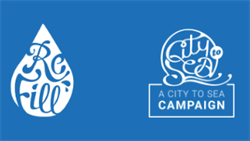 The non-profit City to Sea has coordinated an open letter to the CEOs of the top 5 plastic polluters, Coca-Cola, PepsiCo, Nestlé, Unilever, and Procter & Gamble, to stop using single-use packaging and offer affordable and accessible refillable and reusable packaging instead. The letter also calls on these corporations to deal with the “environmental, social and health impacts” of their plastic use especially on communities in the world’s poorer regions. The letter follows lobbying by schoolchildren across the UK calling on their MPs to do more regarding plastic waste.[Image Credit: © City to Sea ]
The non-profit City to Sea has coordinated an open letter to the CEOs of the top 5 plastic polluters, Coca-Cola, PepsiCo, Nestlé, Unilever, and Procter & Gamble, to stop using single-use packaging and offer affordable and accessible refillable and reusable packaging instead. The letter also calls on these corporations to deal with the “environmental, social and health impacts” of their plastic use especially on communities in the world’s poorer regions. The letter follows lobbying by schoolchildren across the UK calling on their MPs to do more regarding plastic waste.[Image Credit: © City to Sea ]
WRAP Report Highlights How Circular Economy Can Cut Greenhouse Gas Emissions And Grow The Economy
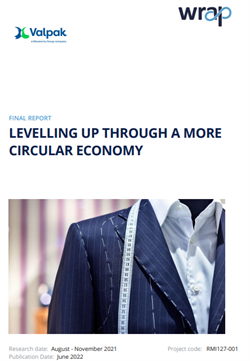
WRAP is focusing on ways to grow the UK economy while reducing greenhouse gas emissions at the same time by adopting a circular economy. The report, “Levelling up through a more circular economy,” was published by the environmental group in response to the Levelling Up White Paper published by the UK government in February 2022. The report says the circular economy is not an abstract concept but is already in existence, creating almost 90,000 jobs across the country between 2014 and 2019. The report also mentions that 33 million tonnes of carbon dioxide would be eliminated each year and 550,000 jobs created by 2030.[Image Credit: © WRAP]
CONSUMER & PUBLIC OPINION
UK Shoppers Want More Refillable Packaging Choices

In the UK, 93% of shoppers said they want more refill options when shopping, according to City to Sea. Results of the research released by the non-profit for the 2022 World Refill Day also revealed that 34% of respondents said that “being able to use” the refill options “would depend on their cost”. The non-profit also worked with the Ecosurety environmental compliance scheme to launch the Bristol Refill Cup Scheme to promote refillable packaging.[Image Credit: © City to Sea]
Only Small Minority Of UK Adults Know What Circular Economy Is
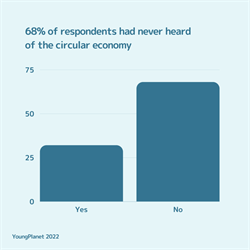
Almost 90% of adults in the UK say they do not know what the circular economy is, according to YoungPlanet. Results of the survey commissioned by the sustainability platform and conducted by YouGov also revealed that only 38% of the 13% of respondents who know what it is “have given or received an item” through the circular economy in the past year. The survey also revealed that 68% of respondents had never heard of the circular economy before, while 19% said they had heard of it but do not know what it is.[Image Credit: © TechRound ]
MARKET NEWS
OECD Report Predicts Global Plastic Waste Will Almost Triple By 2060
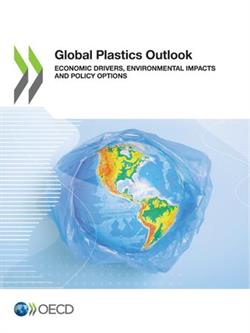
Global production of plastic waste is forecast to almost triple from 460 million tonnes in 2019 to 1,231 million tonnes by 2060, according to the OECD. The authors of “Global Plastics Outlook: Policy Scenarios to 2060” predict that about half of that amount will end up in landfill, with less than 20% being recycled. The report also predicts that growth in plastic consumption will be “fastest in developing and emerging countries in Africa and Asia”. The OECD said that in the absence of “radical” steps and intervention by governments and other stakeholders this projected growth will happen despite the expected increase in the use of recycled plastic.[Image Credit: © OECD]
PACKAGING REDESIGNS
Design4Circularity Seeks To Promote Recyclable Consumer Packaging
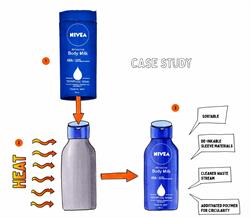
Personal care companies Clariant, Siegwerk, Borealis and Beiersdorf are working together to launch the Design4Circularity initiative to create recyclable consumer packaging. The initiative aims for 100 percent recovery of plastic packaging waste and seeks to create a new standard for circular packaging that promotes less plastic waste, reduced use of virgin plastic, and less climate impact. The initiative features the high-quality visuals and shapes that consumers expect from cosmetics packaging and brands.[Image Credit: © Clariant]
POLICY, REGULATION & LEGAL
California Bill Looks To Force Companies To Reduce Plastic Packaging
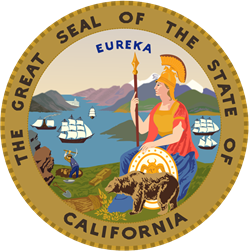 California’s legislature is considering legislation that once enacted would require companies to reduce the amount of plastic in their packaging and push them to adopt reusable alternatives. The provisions of the Plastic Pollution Producer Responsibility Act would require any large brand that sells products in plastic packaging in the state to begin looking for ways to remove some of that plastic. The proposed law would also require producers to reduce the amount of plastic packaging and foodware by 25 percent in the next decade. However, some environmental groups claim the bill is not expansive enough. For example, it does not ban the use of polystyrene foam packaging.[Image Credit: © State of California]
California’s legislature is considering legislation that once enacted would require companies to reduce the amount of plastic in their packaging and push them to adopt reusable alternatives. The provisions of the Plastic Pollution Producer Responsibility Act would require any large brand that sells products in plastic packaging in the state to begin looking for ways to remove some of that plastic. The proposed law would also require producers to reduce the amount of plastic packaging and foodware by 25 percent in the next decade. However, some environmental groups claim the bill is not expansive enough. For example, it does not ban the use of polystyrene foam packaging.[Image Credit: © State of California]
INNOVATION & TECHNOLOGY
T.H.E.M. Develops Environment-Friendly Sachet For Amazon’s Hand Sanitizer
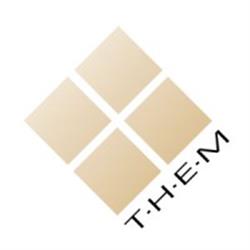
Technical Help in Engineering and Marketing (T.H.E.M.) joined forces with Amazon Basic Care to come up with a sachet for hand sanitizers. The Amazon Basic Care Advanced Hand Sanitizer sachet is made with 60 percent less material per package compared with sachets of the same size. The sachet was a Diamond Finalist in Dow’s 2021 Packaging Innovation Awards competition. Japan-based Maruto Sangyo supplies the film used in making the sachets.[Image Credit: © Technical Help in Engineering and Marketing (T.H.E.M.)]
Compostable Packaging Comes Short Of Being Ideal Single-Use Solution
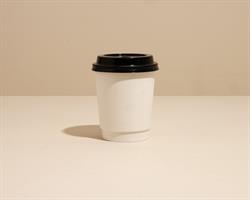 Compostable packaging is gaining popularity especially in the food industry; however, it comes with some issues that limit its viability as a sustainable and environment-friendly option. Compostable packaging is different from “biodegradable”, which refers to materials that can be “broken down into carbon dioxide, water and biomass” by microorganisms in natural settings; and “bio-based”, which are plastics that come from “polymers drawn from organic sources”, including plants and greenhouse gases. It also comes with certain limitations, such as the need for industrial composting facilities and problems with “collection, sorting, and processing”.[Image Credit: © Clair on Unsplash]
Compostable packaging is gaining popularity especially in the food industry; however, it comes with some issues that limit its viability as a sustainable and environment-friendly option. Compostable packaging is different from “biodegradable”, which refers to materials that can be “broken down into carbon dioxide, water and biomass” by microorganisms in natural settings; and “bio-based”, which are plastics that come from “polymers drawn from organic sources”, including plants and greenhouse gases. It also comes with certain limitations, such as the need for industrial composting facilities and problems with “collection, sorting, and processing”.[Image Credit: © Clair on Unsplash]
University of Portsmouth’s CEI To Open New Plastic-Recycling Enzyme Research Facility
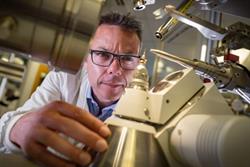 The University of Portsmouth’s Centre for Enzyme Innovation said it plans to open its Industrial Engagement Hub on May 27, 2022. The IEH is proposed as a venue for cooperation between researchers and businesses in developing enzyme-enabled technologies for plastic waste recycling and upcycling applications. Research England funded the CEI’s launch in 2019 after professor and CEI director John McGeehan’s re-engineering of an enzyme into one capable of digesting polyethylene terephthalate (PET) plastics.[Image Credit: © University of Portsmouth]
The University of Portsmouth’s Centre for Enzyme Innovation said it plans to open its Industrial Engagement Hub on May 27, 2022. The IEH is proposed as a venue for cooperation between researchers and businesses in developing enzyme-enabled technologies for plastic waste recycling and upcycling applications. Research England funded the CEI’s launch in 2019 after professor and CEI director John McGeehan’s re-engineering of an enzyme into one capable of digesting polyethylene terephthalate (PET) plastics.[Image Credit: © University of Portsmouth]
Copyright 2026 Business360, Inc.

